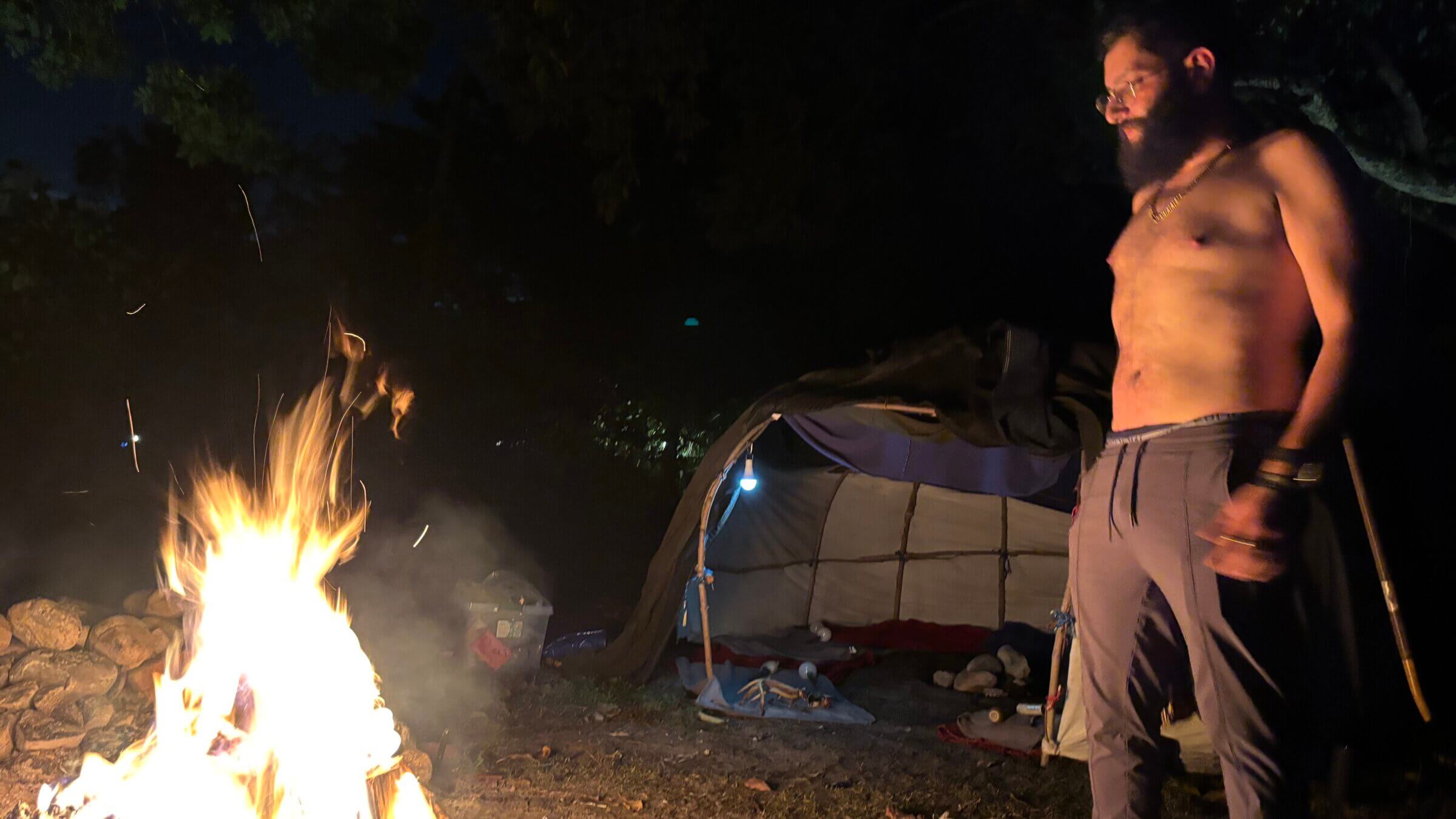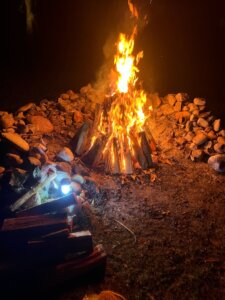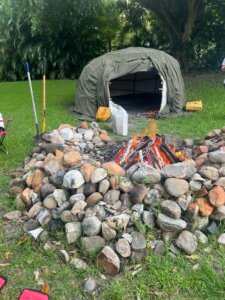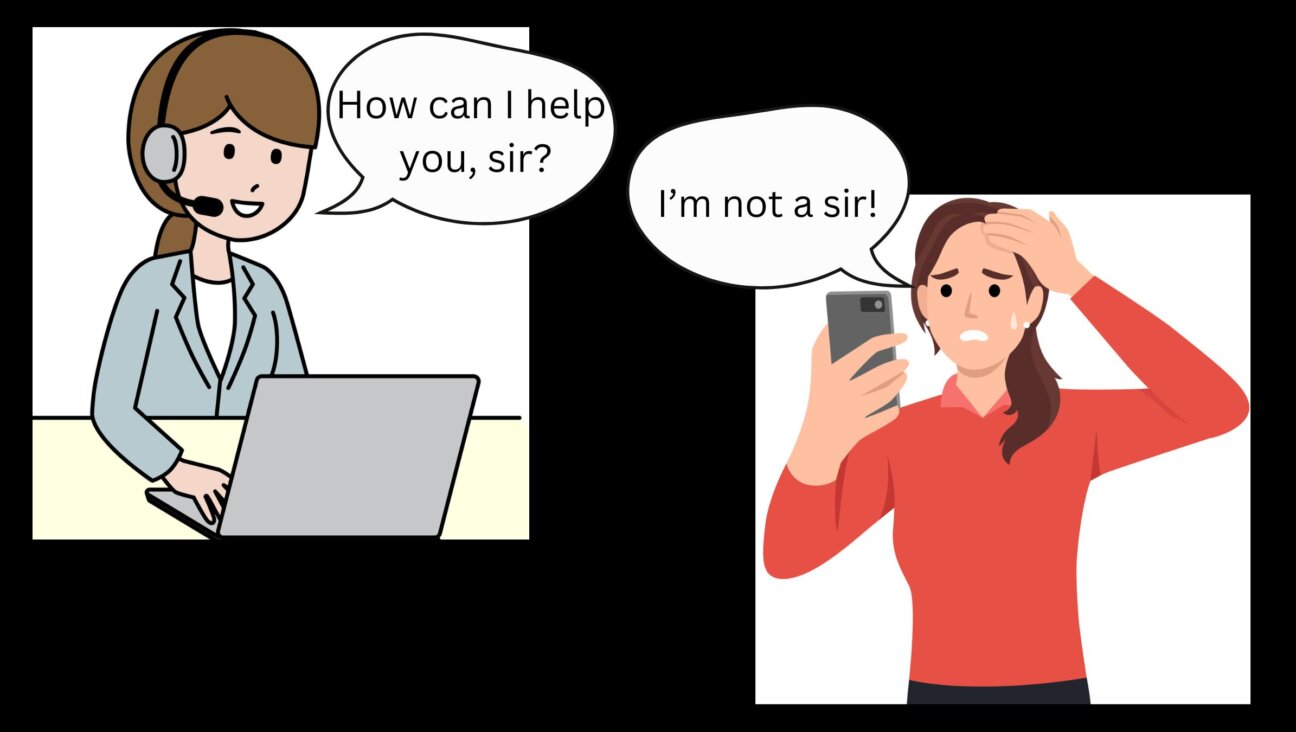At a Hasidic Jewish sweat lodge, enlightenment in the all-encompassing darkness
In a lodge in the Florida Everglades, a steamy brew of Jewish mysticism and indigenous ritual

Daniel Herman, who leads a sweat lodge in Florida, stands before the fire. Courtesy of Daniel Herman
The taxi dropped me off for the lodge on a seemingly deserted street in Southwest Ranches, a neighborhood northwest of Fort Lauderdale, tucked into Florida’s Everglades. Behind me was empty land, in front of me a dead end and to my right, a single dark house. I considered asking the driver to stay and make sure I was in the right place, but I didn’t want to admit I was lost. As he pulled away, I looked around, wondering if a car would ever find me to bring me home.
Then I saw Ester coming toward me, using her phone as a flashlight — that was the only light around, and she used it to lead me up an unpaved driveway to a large backyard field.
I had been invited by my step-nephew Daniel Herman, a bearded, black-hat and kapota wearing Hasid, to participate in a sweat lodge ceremony he has been facilitating for the past year. His sister Ester, a mother of two kids in Hebrew day school, convinced me to join. “It’s going to be beautiful,” she promised.
Ester participated in sweat lodges in Sweetwater, Canada, last summer, as a guest of the Anishinaabe tribe. The heat and steam helps relieve her MS symptoms. This was her first time attending a sweat lodge facilitated by her brother, and she was curious and hopeful about how he would guide the process.
As we approached the bonfire Daniel was building, I turned to him and asked, “How did you decide to start leading sweats?”
He watched the flames the flames. “I was brought to a sweat lodge near the Great Lakes a couple of years ago,” he said. “I felt at home in the darkness right away, it was incredibly healing. I was able to process things from my past that weighed me down.”
Daniel paused before sharing something deeply personal, something he invited me to share again here. As a child, he was abused. When he tried to speak about it, the people he trusted most shamed him into silence. But in the darkness of the lodge, he learned to trust himself — to be an advocate for his innermost thoughts and stories.
“After several months of being a participant,” he said, “an Anishinaabe elder, James Carpenter, asked if I would like to lead the ritual for my community.” Daniel put another log to the fire. “I explained that if I did, it would need to align with Jewish beliefs. We couldn’t use Anishinaabe religious rituals. James understood and respected that, and focused on training me in the practical aspects, making sure I could run the lodge safely.”
Opening a bottle of water to take a sip, Daniel added, “Just a couple of weeks ago James even sent people to help rebuild the lodge, to make sure everything remains safe.”
“The Anishinaabe invite many spirits into the lodge,” Ester said. “They call certain spirits for guidance. I once saw an eagle guiding me.”
This is not a test
Interacting with spirits is forbidden according to Jewish law, and the participants at the sweat lodge are primarily Orthodox Jews. “The Anishinaabe believe each of the rocks is an ancestor being brought into the hut for guidance, but we believe these are just stones we heat up and douse with water to create steam for the sweat,” Daniel said, as he brought over two large pots to place near the fire. “I removed the Anishinaabe’s religious rituals and kept the components that support physical and mental health. Instead of using arrowroot to ward off evil spirits, we use calming herbs like sweetgrass to promote relaxation for the participants.”
As Daniel spoke, he filled the pots with water, and placed them next to a pile of river rocks imported from Canada.

It was a chilly Miami night. I was wearing a sweatshirt and leggings, and as I waited for the other participants to arrive I took a seat as close to the fire as I could. In front of me, just past the fire, was an igloo-shaped tent built from a grid of branches, with blankets covering the floor and a small lantern hanging in the middle.
David, a Chabad Hasid who spends his day studying kabbalah (Jewish mysticism), joined first. Then Elior, Ester’s husband, followed by men and women from Daniel’s community in Hollywood, Florida. We had each brought a change of clothes for the lodge. Daniel recommended something light and breathable — no jeans; they would trap too much heat. Most of the men wore swim trunks and an undershirt, David kept on his tzitzit. The women were wearing oversized shirts and workout clothes.
Once everyone was there, Daniel gave a talk about safety. “The stones are red hot. I will use a pitchfork to put them in the pit at the center of the hut. Do not put your legs near the pit, you could get burned. If you get too hot, heat rises, so lie down.” One of the guests interrupted, joking that he was tougher than the heat.
“This isn’t a test to push your physical boundaries,” Daniel said. “Drink a lot of water, and if you need us to take a break, just let me know.”
He showed us where we could get water. “In the sweat lodge you will experience a lot of uncomfortable symptoms — intense heat, total darkness, maybe anxiety,” he said. “You will be deprived of many senses. Use these limitations to go inwards and experience yourself on a deeper level. Remember, if you can handle the discomfort in the lodge, you can handle discomfort at other times in your life.”
“As a kid I learned to have a bag packed at the door ready for when the Messiah comes to redeem us,” Daniel told us. “In the lodge I realized the ‘packed bag’ is the luggage we all carry inside ourselves. Tonight, look inside yourself to find things you want to let go of, and to raise up what you want to keep.”
This is what we’re here for
In the lodge, drums and maracas were laid out for us to use. As we climbed in, Daniel handed us a leather satchel full of calming herbs to sprinkle on the hot stones. Once we were all seated he pulled the tarp closed, plunging us into total darkness.
Immediately I started to panic. My eyesight is poor and I am afraid of going blind, and there was no light leaking into the lodge. Blinking rapidly, I tried to find a spark, some glimmer from the heated rocks, but I saw nothing. I tried to breathe into it, to let the discomfort pass over me. This is what I’m here for, I reminded myself.
“We will start the ceremony with singing,” Daniel said “Each of us will choose a song, join in when you can.” He started singing “Ani Maamin,” about belief in the promised redemption. Someone else chose “Hamalach Hagoel,” their kids’ favorite bedtime lullaby. It promises we are protected by angels. I chose “Adon Olam,” singing loudly that God is always with us, so we do not need to fear. In the blackness, with David drumming, we sang together, and all the while, Daniel kept pouring water on the rocks, letting the steam warm our bodies.
The air in the lodge got hot and thick. It became hard to breathe while sitting up. Slowly but surely, song after song, I made my way lower, seeking the lighter air, until my face was resting on the earth and I could breathe much more easily.

That’s when the singing slowed and Daniel invited us to share. We talked about our struggles with family and friends, our esoteric struggles with belief. As people talked, the steam merged with our sweat, leaving a thick coating on our bodies.
One of the women shared that she was struggling. She felt as though her family constantly asked for more than she could give, stretching her beyond her limits. How could she find the courage to say no?
“Each law in the Torah is like a string connecting us to God,” David said. “Maybe holding onto those strings will show you the path.”
As he spoke, an image formed in my mind — threads of light hanging down, each one pulling us toward something good, inviting us to grab on. But near the woman’s voice, the imagined lights seemed dim, or covered.
“Maybe women struggle to use the Torah commandments as a consistent guide,” I mused, “because the laws have been interpreted by men for two thousand years? Maybe they’re missing things only women experience.”
Another woman spoke up: “A few years ago I went to a kabbalah class, and felt really inspired, but afterward the rabbi pulled me aside and said women shouldn’t be studying mysticism.”
An older man in the group jumped in: “It’s not just women who are blocked from certain practices. Have you ever seen men at a challah bake?”
Daniel listened, then said, “Things are changing. Just think, 25 years ago we wouldn’t be having this lodge,” he said. “We have to keep shedding light on the darkness around us.”
When he opened the flap a little while later, everyone was lying down, stunned that two hours had passed. It felt like only a few minutes.
A familiar darkness
David immediately left the lodge, and headed over to the property’s outdoor shower to rinse off and change. The rest of us weren’t ready yet. With the lights on, we were able to see each other’s faces, so we continued our conversation.
The same man who had spoken up earlier decided to organize a challah bake. The women made no clear plan — our needs are so varied, and so much has been kept from us. So many texts remain out of reach, so many spaces closed to us, that it’s hard to know where to begin— what is ancient, what has been more recently imposed, and what we might reimagine for ourselves. But sitting together, among people who understood and cared was its own kind of resolution. Maybe that was enough for now, to create spaces where we could speak freely, where we could figure out what we needed together.
As the cold nighttime air seeped into the lodge, we decided to wrap up the experience and step back into the world. Outside, the darkness that had once felt so threatening now felt familiar, almost welcoming. My skin tingled where the steam had touched it, as if the lodge had left an invisible protective layer, a reminder of what we’d shared.
As I left the lodge, Daniel pulled me aside, his expression serious. “Keep having these conversations,” he said.
After changing, I made my way back down the unpaved driveway where Ester had first led me. I knew exactly where I was. I could make out the shapes of the trees in the night sky, my eyes having adjusted to see beauty in the darkness. I called a taxi, no longer worried if it would find me. I knew it would come.
A message from our Publisher & CEO Rachel Fishman Feddersen

I hope you appreciated this article. Before you go, I’d like to ask you to please support the Forward’s award-winning, nonprofit journalism so that we can be prepared for whatever news 2025 brings.
At a time when other newsrooms are closing or cutting back, the Forward has removed its paywall and invested additional resources to report on the ground from Israel and around the U.S. on the impact of the war, rising antisemitism and polarized discourse.
Readers like you make it all possible. Support our work by becoming a Forward Member and connect with our journalism and your community.
— Rachel Fishman Feddersen, Publisher and CEO



























